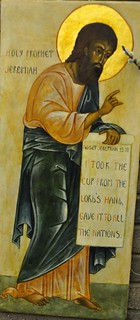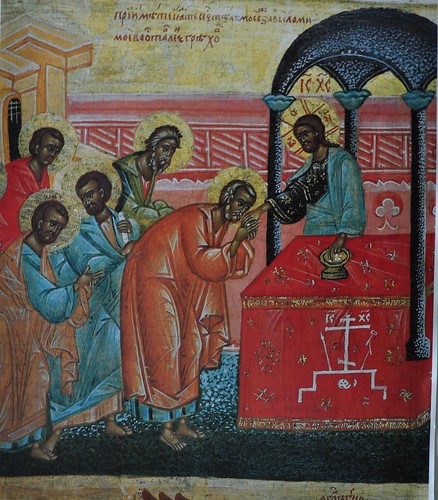 The Book of the Prophet Ezekiel offers us a mystical look at God as well as giving some very profound insights into God’s love, plan for salvation, and into the work of the promised Messiah. Ezekiel also offers us some very specific insights into the Word of God, and also into the Scriptures.
The Book of the Prophet Ezekiel offers us a mystical look at God as well as giving some very profound insights into God’s love, plan for salvation, and into the work of the promised Messiah. Ezekiel also offers us some very specific insights into the Word of God, and also into the Scriptures.
In this blog we look at a few passages from Ezekiel and why they are so significant to our experience of and understanding of the Word of God. For Ezekiel the word of God is not equated with the Scriptures, for the Word of God is not a written text, but rather speaks to us and is heard by us. In Ezekiel, “the word of the Lord” is not merely an object which comes forth from God but more importantly “the word of the Lord” is a personal subject who himself acts in the world. For example at the very beginning of the Prophecy, the Book states:
“…the word of the LORD came to Ezekiel the priest, the son of Buzi, in the land of the Chaldeans by the Chebar canal, and the hand of the LORD was upon him there.” (Ezekiel 1:3)
The text has “the word of the Lord” coming to Ezekiel which is a different image than God speaking a word to Ezekiel, for the text says the Word Himself acts and comes to Ezekiel. What the text suggests is that while the Word comes from God, the Word of the Lord is distinct from the Lord but also a person. We find this same theology in Psalm 33:6, “By the word of the LORD the heavens were made, and all their host by the breath of his mouth.” In the New King James translation of the Bible, as in the Orthodox Study Bible, we read both the Prophets Jeremiah and Ezekiel dozens of times using this phrase: “The word of the Lord came to me saying...” It is an interesting phraseology for it is not saying it is the Lord who comes to the prophets, but the word of the Lord, giving us the image that the Word of the Lord is a person who speaks to the prophets as a person would speak. God’s word is not a thing which God says, but a divine person who speaks! This is the basis for our theological doctrine of the Holy Trinity. And, not only this but also God comes fully present in the divine Word. This is the basis for our understanding of theosis as defended by St. Gregory Palamas. God comes fully present in the Word and we receive not a word from God but God present in His Word, thus enabling us to participate in God.

That God comes present in the Word of the Lord, and that the Word is a fully divine person is the theology found the Prologue of John’s Gospel:
“In the beginning was the Word, and the Word was with God, and the Word was God. He was in the beginning with God; all things were made through him, and without him was not anything made that was made. … He came to his own home, and his own people received him not. But to all who received him, who believed in his name, he gave power to become children of God; who were born, not of blood nor of the will of the flesh nor of the will of man, but of God. And the Word became flesh and dwelt among us, full of grace and truth; we have beheld his glory, glory as of the only Son from the Father.” (John 1:1-3, 1114)
The Word of the Lord who creates all things in the beginning and who becomes incarnate in Jesus Christ and comes to the people of God is the same Word of the Lord who speaks to the Prophets.
Again he said to me, “Prophesy to these bones, and say to them, O dry bones, hear the word of the LORD. Thus says the Lord GOD to these bones: Behold, I will cause breath to enter you, and you shall live. And I will lay sinews upon you, and will cause flesh to come upon you, and cover you with skin, and put breath in you, and you shall live; and you shall know that I am the LORD.” (Ezekiel 37:4-6)
The dry bones of the people of Israel are to listen to the Word of the Lord, for He speaks to them the divine, life-giving message. In hearing the Word the dry, dead bones are vivified. Union with God’s Word gives life to the body.
The idea of the Word of the Lord speaking, rather than God speaking a word, is found in the Prophet Jeremiah:

And the word of the LORD came to me, saying, “Jeremiah, what do you see?” And I said, “I see a rod of almond.” Then the LORD said to me, “You have seen well, for I am watching over my word to perform it.” The word of the LORD came to me a second time, saying, “What do you see?” And I said, “I see a boiling pot, facing away from the north.” Then the LORD said to me, “Out of the north evil shall break forth upon all the inhabitants of the land. (Jeremiah 1:11-14)
The Word is capable of speaking because the Word is a divine Person; in the above text, the Word of the Lord speaking is God speaking. The phrases “the word of the LORD came… saying” and “the Lord said to me” parallel and enrich each other giving us the Trinitarian sense of the Lord and the Word of God being distinct divine Persons.
Then in Ezekiel 3:1-3 we find another image of the Word of God, this time in the written Scriptures:
And he said to me, “Son of man, eat whatever you find here. Eat this scroll, and go, speak to the house of Israel.” So I opened my mouth, and he gave me this scroll to eat. And he said to me, “Son of man, feed your belly with this scroll that I give you and fill your stomach with it.” Then I ate it, and it was in my mouth as sweet as honey.”
The Word of God is not only spoken to us by God, but is a Person. The Word of God is not only something to which we listen, nor even only someone who speaks to us, for the Word comes to us to be consumed by us, entering into our very being. We not only hear the Word of God with the ear, but we commune with the Word in our very being, physically and spiritually.
Your words were found, and I ate them, and Your word was to me the joy and rejoicing of my heart; For I am called by Your name, O LORD God of hosts.(Jeremiah 15:16)
We consume the Word in order to commune with God in our hearts.
Moreover, he said to me, “Son of man, all my words that I shall speak to you receive in your heart, and hear with your ears. (Ezekiel 3:10)
The word is near you, on your lips and in your heart…” (Romans 10:8)
The Word of the Lord enters into our hearts and unites us to God the Trinity.
Your word I have hidden in my heart, that I might not sin against You.(Psalm 119:11)
For thus says the high and lofty One who inhabits eternity, whose name is Holy: “I dwell in the high and holy place, and also with him who is of a contrite and humble spirit, to revive the spirit of the humble, and to revive the heart of the contrite.(Isaiah 57:15)
When the Word of God enters into us, physically and spiritually, we are transformed, becoming partakers of the divine nature (2 Peter 1:4). God does not only speak the Word, but the Word Himself speaks to us in our hearts uniting us to God thus bringing about our salvation.
In many and various ways God spoke of old to our fathers by the prophets; but in these last days he has spoken to us by a Son, whom he appointed the heir of all things, through whom also he created the world. He reflects the glory of God and bears the very stamp of his nature, upholding the universe by his word of power. (Hebrews 1:1-3)






 Both
Both 

